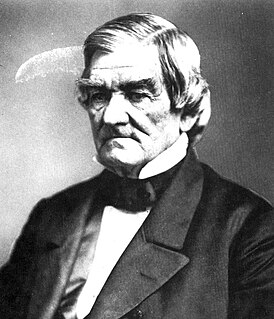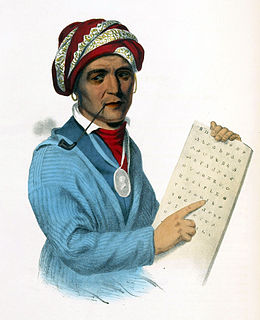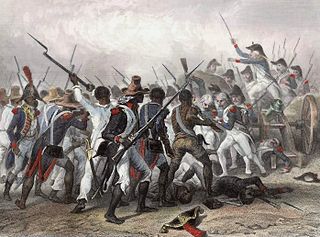Related Research Articles

The Cherokee are one of the indigenous peoples of the Southeastern Woodlands of the United States. Prior to the 18th century, they were concentrated in their homelands, in towns along river valleys of what is now southwestern North Carolina, southeastern Tennessee, edges of western South Carolina, northern Georgia, and northeastern Alabama.

The Blackfoot Confederacy, Niitsitapi or Siksikaitsitapi, is a historic collective name for linguistically related groups that make up the Blackfoot or Blackfeet people: the Siksika ("Blackfoot"), the Kainai or Blood, and two sections of the Peigan or Piikani – the Northern Piikani (Aapátohsipikáni) and the Southern Piikani. Broader definitions include groups such as the Tsúùtínà (Sarcee) and A'aninin who spoke quite different languages but allied with or joined the Blackfoot Confederacy.

Quanah Parker was a war leader of the Kwahadi ("Antelope") band of the Comanche Nation. He was likely born into the Nokoni ("Wanderers") band of Tabby-nocca and grew up among the Kwahadis, the son of Kwahadi Comanche chief Peta Nocona and Cynthia Ann Parker, an Anglo-American who had been abducted as a nine-year-old child and assimilated into the Nokoni tribe. Following the apprehension of several Kiowa chiefs in 1871, Quanah Parker emerged as a dominant figure in the Red River War, clashing repeatedly with Colonel Ranald S. Mackenzie. With European-Americans hunting American bison, the Comanches' primary sustenance, into near extinction, Quanah Parker eventually surrendered and peaceably led the Kwahadi to the reservation at Fort Sill, Oklahoma.

John Ross, , was the Principal Chief of the Cherokee Nation from 1828 to 1866; he served longer in that position than any other person. Described as the Moses of his people, Ross influenced the nation through such tumultuous events as the relocation to Indian Territory and the American Civil War.

Sequoyah, also known as George Gist or George Guess, was a Native American polymath of the Cherokee Nation. In 1821, he completed his independent creation of the Cherokee syllabary, making reading and writing in Cherokee possible. His achievement was one of the few times in recorded history that an individual who was a member of a pre-literate group created an original, effective writing system. His creation of the syllabary allowed the Cherokee nation to be one of the first North American Indigenous groups to have a written language. Sequoyah was also an important representative for the Cherokee nation, by going to Washington, D.C. to sign two relocations and trading of land treaties.
Charles Frazier is an American novelist. He won the 1997 National Book Award for Fiction for Cold Mountain.

Major Ridge, The Ridge was a Cherokee leader, a member of the tribal council, and a lawmaker. As a warrior, he fought in the Cherokee–American wars against American frontiersmen. Later, Major Ridge led the Cherokee in alliances with General Andrew Jackson and the United States in the Creek and Seminole wars of the early 19th century.

The Osage Nation is a Midwestern Native American tribe of the Great Plains. The tribe developed in the Ohio and Mississippi river valleys around 700 BC along with other groups of its language family. They migrated west after the 17th century, settling near the confluence of the Missouri and Mississippi rivers, as a result of Iroquois invading the Ohio Valley in a search for new hunting grounds.

The Cherokee clans are traditional social organizations of Cherokee society.
James Vann was an influential Cherokee leader, one of the triumvirate with Major Ridge and Charles R. Hicks, who led the Upper Towns of East Tennessee and North Georgia as part of the ᎤᏪᏘ ᏣᎳᎩ ᎠᏰᎵ. He was the son of ᏩᎵ (Wali) Vann and Indian trader Joseph John Vann. He was born into his mother's Clan, ᎠᏂᎪᏓᎨᏫ.
William Wayne Keeler (1908–1987) is best known as the last appointed and first elected Principal Chief of the Cherokee Nation in the 20th century. Educated as a chemical engineer, he worked for Phillips Petroleum Company, where he became chief executive officer at the end of a long career with the company. He was one-sixteenth Cherokee, and throughout his life he also worked in the federal government for the advancement of Indians. President Truman appointed him as Principal Chief of the Cherokee Nation of Oklahoma in 1949. He also served as chairman for the executive committee of the Texas Cherokees and Associate Bands from 1939 until 1972. In 1971, he became the Cherokees' first elected chief since 1903.
Yonaguska, (1759–1839), who was known as Drowning Bear, was a leader among the Cherokee of the Lower Towns of North Carolina.

William Holland Thomas was an American merchant and soldier.
The Cherokee Freedmen controversy was a political and tribal dispute between the Cherokee Nation of Oklahoma and descendants of the Cherokee Freedmen regarding the issue of tribal membership. The controversy had resulted in several legal proceedings between the two parties from the late 20th century to August 2017.

The Choctaw freedmen are former enslaved African Americans who were emancipated and granted citizenship in the Choctaw Nation after the Civil War, according to the tribe's new peace treaty with the United States. The term also applies to their contemporary descendants.

John Jolly, was a leader of the Cherokee in Tennessee, the Arkansas Territory, and the Indian Territory, now Oklahoma. After 1818, he was the Principal Chief and after reorganization of the tribal government, he was made president of the Cherokee Nation–West.

The 1842 Slave Revolt in the Cherokee Nation was the largest escape of a group of slaves to occur in the Cherokee Nation, in what was then Indian Territory. The slave revolt started on November 15, 1842, when a group of 20 African-American slaves owned by the Cherokee escaped and tried to reach Mexico, where slavery had been abolished in 1829. Along their way south, they were joined by 15 slaves escaping from the Creek Nation in Indian Territory.
Myrtle Driver Johnson is a native speaker of the Cherokee language. As of July 2019 she was one of 211 remaining Cherokee speakers in the Eastern Band of Cherokee Indians (EBCI).

Sam Houston had a diverse relationship with Native Americans, particularly the Cherokee from Tennessee. He was an adopted son, and he was a negotiator, strategist, and creator of fair public policy for Native Americans as a legislator, governor and president of the Republic of Texas. He left his widowed mother's home around 1808 and was taken in by John Jolly, a leader of the Cherokee. Houston lived in Jolly's village for three years. He adopted Cherokee customs and traditions, which stressed the importance of being honest and fair, and he learned to speak the Cherokee language. He felt that Cherokees and other indigenous people had been short-changed during negotiation of treaties with United States government, the realization influenced his decisions as a military officer, treaty negotiator, and in his roles as governor of the states of Tennessee and Texas, and president of the Republic of Texas.
References
- ↑ "Will Thomas". Eastern Band of the Cherokee Nation (cherokee-nc.com). Retrieved February 10, 2011.
- ↑ Museum of the Cherokee Indians [Usurped!]
- ↑ Shira Boss (2007-05-13). "The Greatest Mystery: Making a Best Seller". The New York Times . Retrieved 2007-11-04.
- ↑ Have We Reached the End of Publishing as We Know it?